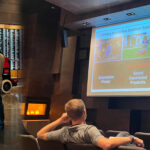How does grass respond physiologically to cutting? What’s the best way to use subsurface irrigation? We’re always looking for answers to questions like these. Fortunately, we have help.
Toro has a reputation for developing solutions that benefit our customers and the environment. But did you know our research and development team includes some of the finest turf schools across the U.S. and beyond?
For decades, Toro has collaborated with a long list of universities to fund research on issues that impact our customers. From turf and soil conditions to greenhouse gas emissions and robotic technology, these projects have covered a range of topics.
Our Turf Research “Dream Team”
A majority of the university research is funded through Toro’s Center for Advanced Turf Technology (CATT), which is made up of a team of leading agronomists and product development professionals. The CATT team works to identify emerging trends and discover new solutions to increase productivity, conserve water, reduce fuel consumption and improve growing conditions — all with the help of the university research we sponsor.
Why University Research?
Working with universities gives us access to facilities and plot space that are set up for controlled turf research — resources above and beyond what we have at Toro. Even more important, it gives us an objective outside perspective. By looking at the same problem from different points of view, we’re able to produce higher-quality, more progressive information. And we use that information to develop and manufacture better product solutions for you.
Focus on Turf and Soil
Much of Toro’s past university research projects have focused on turf and soil conditions. Scientists have studied the development and applications of soil moisture and salinity sensors. They have looked at the physiological effects of mowing, as well as reel and rotary mower sharpness and after-cut appearance. Some have focused on subsurface irrigation. And others have studied automated spectral sensing and geographic information system (GIS) analysis.
Far-Reaching Collaborations
Some of the institutions Toro has worked with include the University of Georgia, Michigan State University, Iowa State University, the University of Minnesota, Purdue University, New Mexico State University, Cornell University and Rutgers University. We have also worked with scientists at universities in Greece and India. This variety has allowed us to study a range of different climates and connect with scientists who have different areas of expertise.
Investing in the Industry
Toro supports independent research because it’s good for the industry, not just for our products. The scientists we work with publish their findings in peer-reviewed scientific journals and industry trade journals, all accessible to the public. It’s a win-win proposition — scientists get needed funding and a chance to work on new, leading-edge technologies with a well-known brand. And Toro gets valuable information that helps drive development for the future. It may take a little more time to bring our innovations to the market, but it helps us get them right.
It’s often said that knowledge is power. With the insights research gives us, we are able to create products that not only solve problems but also give our customers an edge. In addition, our university partners are discovering meaningful new ways for us all to work more efficiently, conserve water and energy, and become more environmentally responsible.















